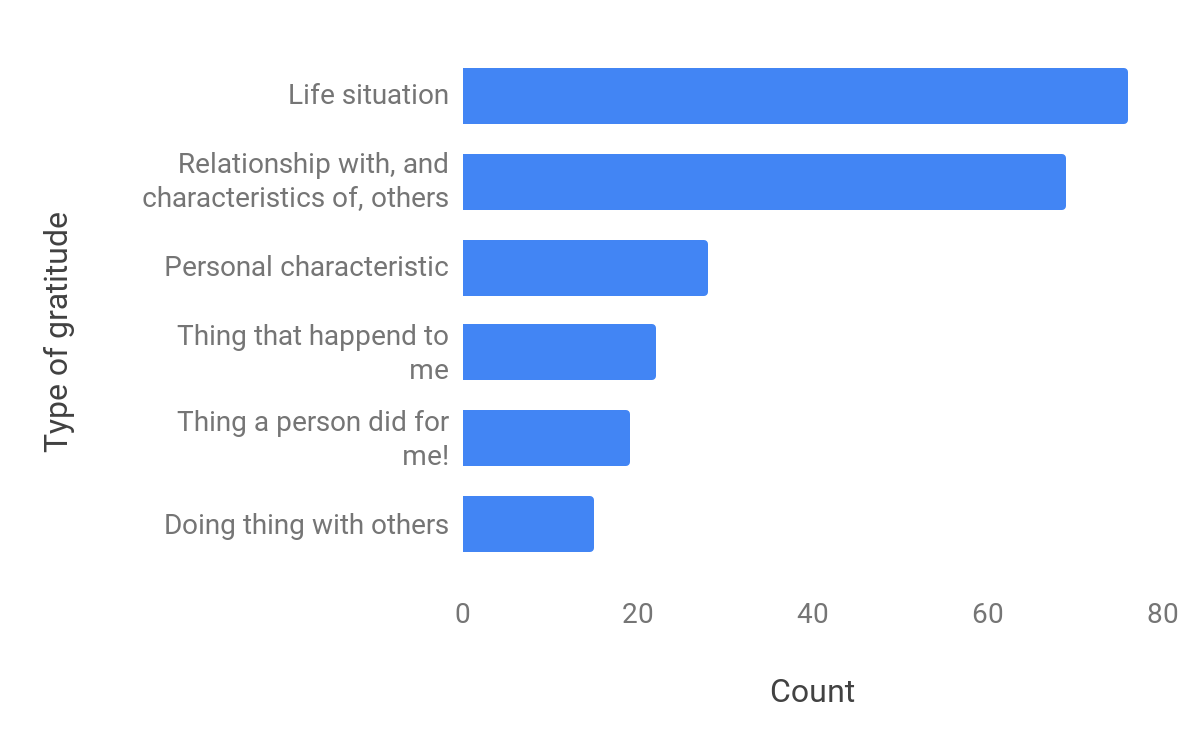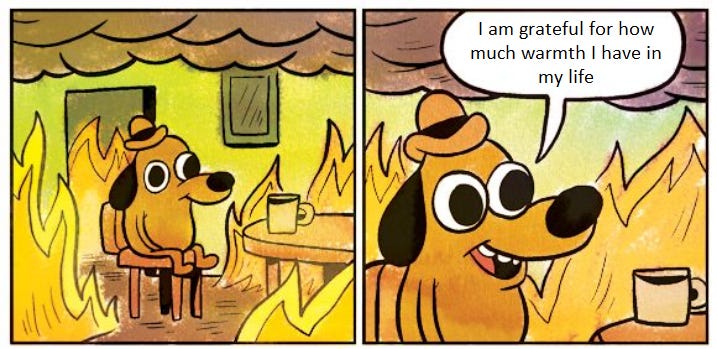How I was doing gratitude wrong for a year
During 2019/20 I recorded what I felt grateful for most days. Looking back over this data, I noticed some troubling patterns.
Summary
I spent a year filling in a gratitude journal.
I recently analysed the data from this journal and realised I was making a few mistakes. I was:
using gratitude to feel good about myself relative to others, rather than seeing it as a response to care.
expressing gratitude for general patterns in my life (which resulted in some self-deception), rather than identifying specific things that I was grateful for.
failing to express any self-gratitude.
Most good things in life are the result of someone caring for you in some way, so it’s usually easy to notice examples.
Gratitude as a response to specific instances of care seems particularly powerful and I now try to make it the basis of my gratitude practice.
I subsequently found out that this is actually how gratitude is defined by many people who research it. The other stuff I was doing might not have really been gratitude
How I was doing gratitude wrong for a year
At some point in 2019 I read about gratitude journaling. I had heard on some podcast that there was good evidence that it could reliably improve personal wellbeing. I really like personal wellbeing, so I was keen to start.
I kept a gratitude journal for the next year. Most mornings, as part of my morning routine, I would write something I was grateful for into an app on my phone. The process was:
Write the words “I am grateful for…”
Write down the first thing or things that come into my mind.
I still have the data from this gratitude diary. Here are some randomly selected examples:
“I'm grateful for the fact I can work on projects that really help people and use my skills well”
“I'm grateful for this morning routine, it helps me feel calm and in control”
“I am grateful that I can play the saxophone. It's really fun and not an easy skill to develop”
“I'm grateful I got an interview. It's a great job and a great sign of my potential even if I don't get it.”
This was okay. Often I would usually feel kinda good as I reflected on things I was grateful for. I also really enjoyed telling people that I had a daily gratitude journal.
But after a year this got old. It started to feel more like an obligation than something that was adding value. So I stopped. I was reflecting on gratitude this month, and checked out the data I had recorded. I noticed something I had been doing wrong.
My previous approach to gratitude
Recently I looked back on the year worth of gratitude that I recorded. To get a clearer overview, I categorised each of the 220 entries based on the kind of thing I was expressing gratitude about. Here are the results:
Figure 1: Count of my expressions of gratitude by category, September 2019 - August 2020
These categories are a little rough and fudgy, but here is an example of each:
Life situation - “I'm grateful for living in London. There are many great things about being in this city, surrounded by people.”
Relationship with and characteristics of others - “I'm grateful for having housemates who are all so keen to work on self-improvement.”
Personal characteristic - “I'm grateful for my ability to make tasty food. It makes me and others happy. “
Thing that happened to me - “I'm grateful that I got the promotion!”
Thing a person did for me - “I’m grateful for the emotional support [friend] gave me when I was feeling sad.”
Doing thing with others - “I'm grateful for that run with [friend], it was fun.”
I also made the below framework for these categories of gratitude:
(the strength of the colour represents how often I expressed that type of gratitude)
Table 1: Count of each type of gratitude that I expressed, and how they categorised

General = “I like that this person or thing in my life is a certain way in general”.
Specific = “I like that this specific thing happened”
What I got wrong about gratitude
1. I was using gratitude to feel good about myself, rather than seeing it as a response to care
Gratitude practice seems to work, in part, because it draws your attention to things that make you feel good. This might be mostly wholesome, but here are some more mixed examples:
You feel pride about a positive thing about yourself or your life
You reflect on how things could be worse by pitying others
Although pride and pity can feel good, they are double-edged. They reinforce a mental habit of comparing yourself to others. The times I’ve found myself relying on these comparison-based feelings for self-esteem are also the times when I have been most vulnerable to criticism or most afraid of acknowledging that others are better than me at something.
In my experience the most wholesome form of gratitude is as a response to an act of care. By this light, gratitude is an emotion intended for expressing to someone that you appreciate something they have done. (my shallow research into this suggests that while there is a lot of disagreement in academia - lots of places actually define gratitude as a response to an act of care).
If you believe in a god, or otherwise personify the universe, then you may be able to see a lot of things in your life as the result of someone caring about you; I do not, so most of the “Life situation” gratitude that I expressed involved explicitly or implicitly comparing myself to others to make myself feel better. But most of this kind of gratitude could have been reframed as a response to care - e.g:
“I am grateful for feeling valued at work” → “I am grateful that [colleague(s)] did [thing that made me feel valued]”
The main exception to the above might be gratitude that is felt as a response to a negative visualisation. Negative visualisation is a stoic technique in which you imagine losing something you value. This seems pretty valuable and wholesome to me, although might be better described as relief.
2. I was expressing gratitude for things very generally most of the time
Most of the gratitude I expressed was general, e.g. “I am happy that I can spend time relaxing with friends so often”; rather than specific, e.g. “I am grateful for that conversation with [friend] yesterday.”
General expressions of gratitude seem more powerful, because they are identifying a big pattern rather than just one specific observation. But that is also the problem. You are much more likely to misidentify a pattern. For example, in June 2020 I said:
“I'm grateful for my career, I am very lucky to be where I am. To be able to do something interesting and important and get paid a lot. Most people have none of these.”
I was not very unhappy and stressed out in this job. After I eventually left, I decided that I would have been better off leaving that role much earlier. I am pretty sure this is an example of me doing some kind of emotional repression. This is the “eat your dinner because children are starving in Africa” approach to dealing with negative emotions.
I was telling myself that I “should” feel grateful because of how I think others would perceive my situation rather than actually feeling gratitude. More generally, when you express gratitude for patterns in your life, instead of observations, you are much more likely to be self-deceiving, engaging in toxic positivity, or self-gaslighting (all of which are tools for hiding negative feelings from yourself). It’s much harder to deceive yourself about specific feelings that you are experiencing right now.
3. I was not expressing any self-gratitude
It’s possible I just wasn’t feeling much self-gratitude, but I definitely never expressed any (see that zero in Table 1 above). I try to do this now as it feels really powerful. It looks like this:
“I am grateful that I did that nice thing for myself”
A specific example might be:
“I am grateful to yesterday-Toby for putting a glass of water on my bedside table so that I could have a drink when I woke up”
I had noticed during my year-of-gratitude that self-compassion (feeling a sense of connection and care for my own experience) is a reliably positive way of responding to negative feelings and situations. But it wasn’t until much more recently that I noticed just how much opportunity there was to connect with self-gratitude also. I am constantly doing nice things for myself because I care about myself. Like all the time, everyday. Taking care of myself is my main thing.
Self gratitude and self compassion appear to be mutually supportive too. By letting self-care motivate my behaviour more, I have developed a stronger sense that I am looking after myself and it becomes easier to feel self-gratitude.
How I try to do gratitude now
Looking back at Table 1, I only expressed gratitude for specific things that someone had done 19 times (out of a total of 220 days). I have been trying to change that.
Key ways I approach gratitude differently now:
Identify the person who I think did a nice thing for me (which could be myself)
Identify the specific thing that they did.
Express to them that I appreciate the thing that they did!
I still feel more general and impersonal forms of gratitude-like feelings. But I am a little more wary of strongly encouraging these now. They come with clear risks of reinforcing comparison-to-others and self-deception.
If you are like me, you will also find it particularly powerful to direct more attention to all the real and specific ways you are being cared for by yourself and the people around you.





I honestly also feel gratitude for you writting this blog. I watched some youtube videos on how to be happy, and gratitude was a big part of it. But then I watched youtube videos on how to do gratitude, and it left me confused. But now I remembered that you have a blog about it, and read it, and feel much less confused :)
One thing of a little value that I can say is that expressing gratitude to others (that you mentioned) is key, because according to this video https://www.youtube.com/watch?v=ph1BuMRFJ88 receiving gratitude from others is the most powerful type. Although personally, when someone expresses gratitude to me, I just shrug it off and don't think about it at all and feel nothing, so maybe there is also something about learning to accept gratitude from others :)
In all honesty, not just trying to be ironic: I have gratitude for all of the people who take time to get into the details of things, and share their learning publicly.
It takes a lot of work at each step, and you will never directly see the reward. But, for what it’s worth, deep dives like this have always been really helpful to me and I look forward to trying to apply your new insight myself